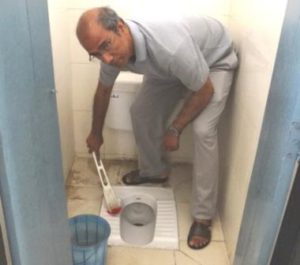Education is all about learning for life, isn’t it? That’s the reason why a Jesuit college in Patna chose to remain open on International Labour Day, and have the teachers do the menial tasks for a change. So, the Principal and the vice-principal when around the college cleaning toilets and restrooms, while other members of the teaching faculty mopped, dusted, and swept out the campus. Still other teachers prepared the morning tea and snacks. The ‘non-teaching’ staff generally relaxed and were treated to a special high tea. And the students? They observed.

International Workers’ Day was observed as a holiday in most places. What’s better than to give your ‘fourth grade’ blue collar colleagues – the peons, cleaning personnel, and such the day off? Some organized picnics and cookouts for their ‘labouring’ staff.
The Principal and professors of St. Xavier’s College (and St. Xavier’s College of Management and Technology) spent ILO day cleaning toilets, sweeping corridors, and preparing tea for their colleagues in ‘ maintenance’.
“Usually May 1st is a holiday in the name of labourers. Nobody bothers about them, except that everyone gets a holiday. This is of no use. So, May Day is of no consequence in ameliorating the conditions of the workers. There is no need for us to enjoy a holiday in their name. May Day has actually of no real meaning for them,” said the reverend Dr Tomy Nishaant, principal of the college, spotted brushing away at a squatter-style water closet on the premises.
The teachers and management , imitating Mahatma Gandhi, some would say, sought to address the very ideology of the Indian caste system, by which only a group of people belonging to a particular caste are meant to do such ‘polluting’ works as cleaning up garbage, excreta, and so on.
It is common knowledge that all the sweepers, cleaners, and drainage maintenance staff of the Municipal Corporation come from among the Dalit castes. Even the morgue attendants and workers who handle the corpses are from the so-called ‘untouchable’ castes.
“Enlightened people can act against such an ideology by volunteering to do such works. This is a symbolic way of valuing the dignity of work itself, whether it is cleaning toilet or lecturing students,” says Nishaant.
In an institution, there are different grades of employees. The hierarchy is a well-guarded system which de-values manual works as menial. Thereby, the members of the Maintenance staff are also looked down upon. Interestingly, though the college didn’t have a holiday, students were not part of the exercise. “When the students see the professors willingly doing the works of the maintenance staff, they understand that these works are valuable, and that one’s dignity isn’t taken away by sweeping or cleaning,” a teacher said.
The male teachers took over the responsibility of making the tea and serving the snacks to the maintenance staff, obviously breaking the gender stereotype as well.
During the tea and camaraderie that followed the exercise, professors shared their experiences with each other, and they generally agreed that the tasks were difficult.
“The management didn’t force any of the teachers to join in the kar-seva. It was entirely voluntary. Imagine, I hardly ever mop the floor at home, I have a maid for that. And here was I mopping the entire length of the corridor. Back breaking. Experienced what my maids have to do for a living. I swear, after I get back home, I’m going to put my feet up and rest!” declared one teacher over the phone.
The good principal hopes that such exercises, though symbolic, bring about a transformation in attitude towards the value of labour, especially manual labour and labourers. Attitudinal changes are one of the main components of quality education, says Nishaant. No doubt about that! But in this callous and commercial society, the question hanging in the balance is, did the students really get the point?


